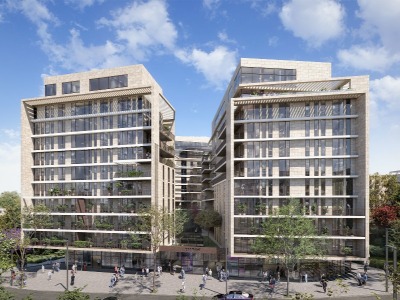
Whether you are a first time buyer, upgrading or downsizing your current apartment, an investor or buying a vacation apartment in Israel, you are probably asking yourself whether it’s the right time to buy. Has the bubble finally reached its bursting point? Will prices in Israel start to come down? As a realtor for over 23 years, I am asked that question daily. Working predominantely with foreign buyers and new immigrant families who come from markets that cycle every 2-5 years, they are curious why the Israeli real estate market has continued to increase for over 10 years now.
Answering this golden question is complex and includes multi-faceted segments that need to be analyzed. Here are some of the factors that have contributed to the rise (and at times stabilization) in the real estate industry in Israel.
Lets start with government instability. With 5 elections over the last 3 years (2019-2022) and 3 various coalitions governing the country in the last 4 yrs alone, it is no wonder that there would be inconsistency and chaos regarding the implementation of housing policies. Over the years, subsidies were given to builders, incentives were then passed on to young couples, encouraging them to purchase new construction. Changes in the purchase tax paid by local and foreign buyers alike failed to make a difference in the rising market and unfortunately, over the last 10 years implementation of these reforms had no lasting effect on stabilizing the soaring market.
Some of the solutions were the numerous attempts by various governments over the last 10 years to implement policies and programs that were meant to encourage more young families to purchase homes. Unfortunately, those attempts helped very few buyers, and didn’t even make a dent in the housing crisis. Other solutions that incentivized builders and were meant to reduce the exhausting and lengthy bureaucratic red tape also failed and prices continued to soar.
The next event we are currently experiencing is the political uncertainty due to the Judicial reform issues polarizing the population. Many leading economic experts are forecasting devastating consequences for the Israeli economy due to the threat to the country's democracy. This polarization among the citizens of Israel and certain actions taken by the current government have already had major ramifications. There has been a noticeable departure of many high-tech companies, many medical professionals are relocating abroad, and the downgrading of the country's standing throughout the world will have an ongoing effect on the economy’s ability to thrive. The effect on the real estate market is being felt as we witness less interest from foreign investors who planned to buy investment properties in Israel, as well as foreign home buyers’ who are sitting on the fence and waiting to buy. Whether this will cause a downturn in the market and price reduction among sellers, is yet to be seen.
Advances in Israel's transit system is definitely a step in the right direction to improving mobility and allowing access for more people to work in the center of the country yet live in more remote areas. This is a highly effective way to move the population to more peripheral areas, allowing for less congestion in the central areas and crowded cities, such as Tel Aviv, Haifa and Jerusalem. This will create less demand for apartments in the central, more expensive areas, leaving more supply on the market and hopefully allowing prices to stabilize both in the sales and in the rental arena.
Inflation and rising interest rates are other factors that have influenced the real estate market. Since April 2022, the bank of Israel has raised interest rates more than 7 times, from a low of 0.1% to approximately 4.5 % today. Their goal of lowering inflation was admirable when inflation hit a 20 yr high in 2020, reaching 5.3%, but this came at a high cost to homeowners with variable and linked mortgages. Some young families had increases in their monthly mortgage payments costing them thousands of shekels more each month. This created havoc among families whose earnings were not going up, and in addition, dealing with food and basic services increasing beyond reason. The effect on the real estate market was a slowdown in the upward mobility of families to move from smaller apartments to larger, again creating less supply in a market that is already starving for inventory. The lack of buying power for new construction resulted in a crisis for the builders of new projects. The combination of higher interest rates for the land they had already purchased and financed, together with the increased costs of building materials due to inflation and the lack of potential buyers, caused many projects to go bankrupt.
Tama Projects (project renewal) in major cities have been spared this fate, since many builders are selling their “high end” penthouses that are built on top of existing buildings, to high-end foreign buyers. These builders have less risk because their construction costs are lower since they are not starting with raw land, and already have the infrastructure provided for them. The strength of the dollar/euro is allowing foreign buyers to pay much less for these properties relative to the shekel price since their currency is now worth much more compared to the shekel. The foreign buyers who are taking advantage of this currency discrepancy are able to save hundreds of thousands of shekels on their purchases.
To summarize the market and answer the golden question …Is this a time to buy, or a time to wait? In my 23 yrs in this industry here in Israel, I have seen the ups and the downs in our market, and despite all the valiant efforts of the government to increase the supply of apartments in the market, I believe that the increase in population, both naturally (due to more children in the religious population) and taking into account Aliyah from abroad, will continue to create more demand than our little country is able to keep up with. Therefore, my advice is … Buy now… sell later !
The writer is a real estate agent with RE/MAX Vision in Jerusalem and specializes in the luxury and high-end market. She has been in the real estate business in Jerusalem for over 25 years and is available for free consultations regarding both buying and selling homes anywhere in Israel. She can be reached at 054-668-4111 [email protected] www.remaxjerusalem.com.


As we step into 2024, many are left wondering: Is now the right time to invest in real estate? With interest rates fluctuating, economic uncertainties lingering, and the housing market showing signs of both resilience and volatility, it's only natural one might feel uncertain about making such a significant financial decision.

The recent months have demonstrated how deeply the spirit of volunteering and community contribution is embedded in Israeli society. Yet, alongside the impressive enrolment of many individuals and businesses during the war on Hamas, there are entities for whom community responsibility has long been a way of life.

The Israeli real estate market is entering uncharted territory in Q1 2024, with recent events, notably the 7/10 attack and the ensuing conflict in Gaza, casting a significant shadow over the buying and selling landscape.

Where and what type of property should I purchase? What areas offer the best value? What are the up-and-coming locations? How much can I afford to invest in my purchase? Should I buy a new property or renovate? And how do I go about the complex process?
Tell us what you are looking for, and we will be happy to be of service to you